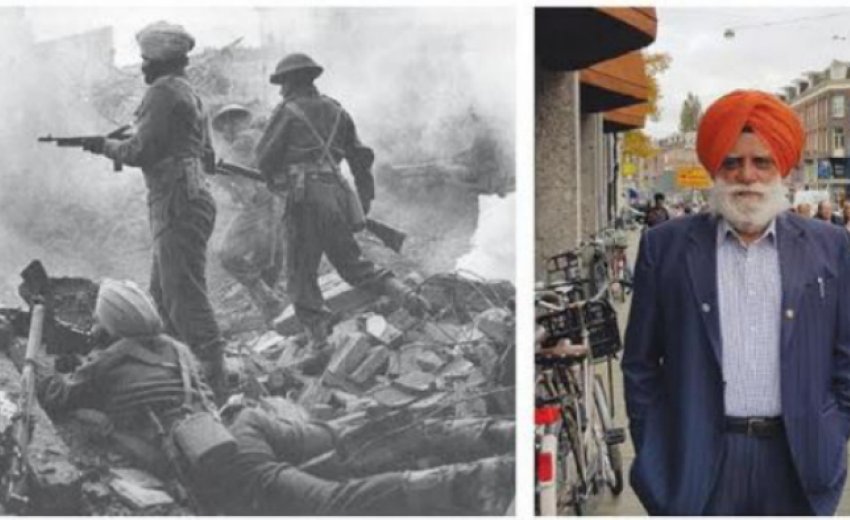'It is important that everyone knows what the Sikhs have done for mankind'
It is not well known to the general public that Dutch people, in Japanese internment camps, were liberated by Sikh soldiers during WWII, according to Sardar Bhupinder Singh Holland the Indian-Dutch Sikh writer and director of the International Human Rights Organization of the 'Dutch Sikhs'.
In these camps civilians and soldiers were under the control of the Japanese authorities during the Japanese occupation of the Dutch East Indies (1942-1945). In his own words, Holland made it his mission to inform the public about the role that Sikhs played in the liberation and wrote the first thick-book Sikhs in World War II (2014).
The Kanttekening (a Dutch newspaper) spoke to Holland: military historian, Christ Klep: University of Utrecht, and Elisabeth Harwig: Japanese internment camp survivor, about this interesting piece of history. The Sikh soldiers who liberated the Dutch were part of the colonial British-Indian army and fought under the banner of the Allies. In many history books about the Second World War there is little or no mention of these soldiers.
Sikh literally means disciple. A Sikh tries to lead a charitable life. Sikhism originated in the early sixteenth century. It is a monotheistic religion and stands for equality and justice. Sikhs do not eat meat, pray five times a day and do not consume alcohol. The Indian-born but forty-five years living in the Netherlands, Holland, who is also a Sikh, started in 1996 with a study of the contributions of the Sikh soldiers in the Second World War. During his research, which lasted for years, he collected, among other things, the names of the soldiers, father names, their native villages, the countries where they died and information about their regiments and battle history. That resulted in the book "Sikhs in World War II." Holland wrote several other books about Sikhs.
'It is important that everyone knows what the Sikhs contributed to the world,' says Holland. 'They were also present at D-Day (1944, ed.) And the Evacuation from Dunkirk (1940, ed.). Some half a million Indians fought in the British army, including some forty-five thousand Sikhs (Correction; 2.5 million British Indian soldiers and among them half a million Sikhs). Sikhs have fought in twenty-five countries
Sikhs are traditionally warriors. "It was a typical colonial aid army, as the Netherlands had the Royal Dutch East Indies Army. The 'soldiers with a turban' arrived in large ships from India to Great Britain, from where they were sent to various missions in Europe. 'That gave the Sikhs a dilemma', says Klep. 'They also conducted a long-term independence struggle against the British authority. Did you have to fight for or resist the 'master', Great Britain? "Singh adds:" One reason for the Sikhs to take part in the war was that they hoped that attention would be paid to their pursuit of independence. However, bringing peace was more important to them. After all, Sikhism encompasses several pillars, of which fighting injustice is one. "According to Klep, thousands of Sikhs have participated in liberating Dutch in the Dutch East Indies.*
It is estimated that around one hundred thousand Dutch people were in the Japanese camps. Since 1999, the fallen Sikh soldiers were commemorated on 4 May at the National Monument on Dam Square in Amsterdam. Klep observes that no Sikh soldiers can be seen in the much-discussed war film Dunkirk, while a significant number of Sikhs participated in the evacuation of Dunkirk. "The justified comment has sometimes been made that not Great Britain, but the troops of the Commonwealth of Nations won the Second World War.
As Allies, the Sikh soldiers are indeed recognized. They are commemorated in cemeteries and in monuments in countries such as Canada and Italy. "The Commonwealth of Nations is a voluntary union between fifty-two independent sovereign states with the British Queen Elizabeth II as symbolic head. The Commonwealth consists of the United Kingdom and most of its former colonies and mandate areas. There are many testimonies from survivors of the Japanese camps, such as Harwig (78), who tell stories about seeing Sikh soldiers during the liberation of the Dutch. Harwig was born in Indonesian Semarang.
She ended up with her family in the Ambawara camp. "I was five years old. There were no toys, and no one could go to school. At one point we also had less to eat. "She remembers things like being in the sun for hours. "You had to keep on bending all that time."** In another camp she was personally shot at once. "I was not touched then." She says that she sees Sikhs every year at the laying of the wreath during the National Commemoration in Amsterdam. "I saw them there for the first time after the war."
*= In March 1942 Japan occupied Indonesia, which was a Dutch colony at the time. After the capitulation of Japan in August 1945, the British were given the responsibility to liberate Indonesia, 45000 British Indian Soldiers, most of them were Sikh Soldiers, landed in Indonesia to do just that. Japan had captured and imprisoned over 100,000 Dutch, British and Americans and kept them in prison camps. And this Dutch article highlights the liberation of the Dutch people in Indonesia by the Sikh soldiers.
**= E. Harwig mentioned bowing down to the Japanese soldiers, this was something the Japanese forced the civilians to do in order to make life even more difficult for them.
I will attach 4 links regarding this topic which includes the former Foreign Minister of the Netherlands who was also liberated by Sikh soldiers. As well as Dolf Kruyt and E. Harwig, who were citizens rescued by the Sikhs.
https://www.sikhnet.com/news/interview-mr-ben-bott-former-dutch-foreign-minister
https://www.sikhnet.com/news/netherland-commemorates-victims-war
The books can be ordered at [email protected]

